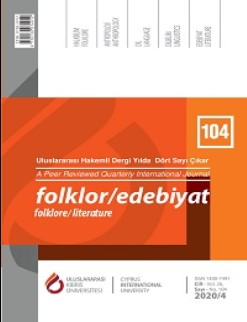Samed Vurgun’un ‘Ferhad ve Şirin’ Oyunu ile Nazım Hikmet’in ‘Ferhad ile Şirin’ Oyunu Üzerine Mukayeseli Bir İnceleme
A Comparative Review on Samed Vurgun’s and Nazım Hikmet’s ‘Ferhad and Şirin’ Theatre Plays
Author(s): Ayşe Ulusoy TunçelSubject(s): Theatre, Dance, Performing Arts, Studies of Literature, Recent History (1900 till today), Turkish Literature, Other Language Literature
Published by: Uluslararası Kıbrıs Üniversitesi
Keywords: theater literature; Azerbaijan theater; Samed Vurgun; Nazım Hikmet; Ferhad and Şirin; socialist realism;
Summary/Abstract: Ferhad ü Şirin story, which has been a chapter of Hüsrev ü Şirin story that was worked on in the Eastern literatures for centuries, has been also a subject of the theater literature. Among the poets who converted a story into a theater play in the Turkish literature, Nazım Hikmet and Samed Vurgun, who lived in different geographies but in the same periods and adopted the same art method, especially draw attention. While Samed Vurgun from the Azeri Literature converted the story into a theatre play in a poetical way with the name Ferhad and Şirin, he used the mesnevi Husrev and Şirin of XII century poet Nizamî as a source (1941). Nazım Hikmet, on the other hand, wrote Ferhad and Şirin in a prosaic style based on the folk story version of the work (1948). Both poets reflected their socialist-realist understanding of art to their works, and featured the character of ‘Ferhad’, a folk hero. Due to the differences caused by the poets’ temperaments, the culture of their surroundings and their individual life stories, and the political events of their time, they enriched the story with new elements or omitted some elements. While both poets retained the motif of ‘Ferhad’s strong love for Sirin’ in their works that they built around two love and three people, Nazım Hikmet converted this love into a love of public service and Samed Vurgun added the love of homeland and freedom to the work.
Journal: Folklor/Edebiyat
- Issue Year: 26/2020
- Issue No: 104
- Page Range: 883-906
- Page Count: 24
- Language: Turkish

